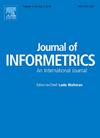Distinguishing articles in questionable and non-questionable psychology journals using quantitative indicators associated with quality
IF 3.5
2区 管理学
Q2 COMPUTER SCIENCE, INTERDISCIPLINARY APPLICATIONS
引用次数: 0
Abstract
This study investigates the viability of distinguishing articles in questionable journals (QJs) from those in non-QJs on the basis of quantitative indicators typically associated with quality. Subsequently, I examine what can be deduced about the quality of articles in QJs based on the differences observed. The samples comprise 1,714 articles from 31 QJs, 1,691 articles from 16 journals indexed in Web of Science (WoS), and 1,900 articles from 45 mid-tier journals, all in the field of psychology. I contrast between samples the length of abstracts and full-texts, prevalence of spelling errors, text readability, number of references and citations, the size and internationality of the author team, the documentation of ethics and informed consent statements, and the presence of statistical errors. The results suggest that QJ articles do diverge from the disciplinary standards set by peer-reviewed journals in psychology on quantitative indicators of quality that tend to reflect the effect of peer review and editorial processes. However, mid-tier and WoS journals are also affected by potential quality concerns, such as under-reporting of ethics and informed consent processes and the presence of errors in interpreting statistics. Further research is required to develop a comprehensive understanding of the quality of articles in QJs.
使用与质量相关的定量指标来区分可疑和非可疑心理学期刊上的文章
本研究调查了基于通常与质量相关的定量指标区分可疑期刊(QJs)和非QJs文章的可行性。随后,根据观察到的差异,我研究了qj中文章质量的推断。样本包括来自31个qj的1714篇文章,来自Web of Science (WoS)索引的16种期刊的1691篇文章,以及来自45种中级期刊的1900篇文章,均为心理学领域的文章。我对比了摘要和全文的长度、拼写错误的普遍程度、文本可读性、参考文献和引用的数量、作者团队的规模和国际性、伦理和知情同意声明的文档以及统计错误的存在。结果表明,QJ论文在质量的定量指标上确实偏离了心理学同行评议期刊设定的学科标准,这些指标往往反映同行评议和编辑过程的影响。然而,中级和WoS期刊也受到潜在质量问题的影响,例如对伦理和知情同意过程的报道不足,以及在解释统计数据时存在错误。要全面了解问答文章的质量,还需要进一步的研究。
本文章由计算机程序翻译,如有差异,请以英文原文为准。
求助全文
约1分钟内获得全文
求助全文
来源期刊

Journal of Informetrics
Social Sciences-Library and Information Sciences
CiteScore
6.40
自引率
16.20%
发文量
95
期刊介绍:
Journal of Informetrics (JOI) publishes rigorous high-quality research on quantitative aspects of information science. The main focus of the journal is on topics in bibliometrics, scientometrics, webometrics, patentometrics, altmetrics and research evaluation. Contributions studying informetric problems using methods from other quantitative fields, such as mathematics, statistics, computer science, economics and econometrics, and network science, are especially encouraged. JOI publishes both theoretical and empirical work. In general, case studies, for instance a bibliometric analysis focusing on a specific research field or a specific country, are not considered suitable for publication in JOI, unless they contain innovative methodological elements.
 求助内容:
求助内容: 应助结果提醒方式:
应助结果提醒方式:


